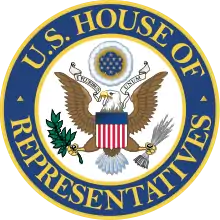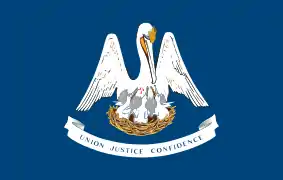John Edward Bouligny
John Edward Bouligny (February 5, 1824 – February 20, 1864) was a member of the U.S. House of Representatives representing the state of Louisiana. He served one term as a member of the Know Nothing movement's anti-immigrant American Party. During his term, Louisiana seceded from the Union, but Bouligny remained in Washington and refused to resign. He was the only member of Congress from Louisiana to not resign after the state seceded.
John Edward Bouligny | |
|---|---|
.png.webp) | |
| Member of the U.S. House of Representatives from Louisiana's 1st district | |
| In office December 5, 1859 – March 2, 1861 | |
| Preceded by | George Eustis Jr. |
| Succeeded by | vacant |
| Personal details | |
| Born | May 5, 1824 New Orleans, Louisiana |
| Died | May 20, 1864 (aged 40) Washington, D.C. |
| Resting place | Congressional Cemetery |
| Political party | American Party |
| Spouse(s) | Mary Elizabeth Parker
(m. 1860) |
| Alma mater | Transylvania University |
| Occupation | Lawyer |
Biography
Bouligny, who went by his middle name Edward, was born in New Orleans. He was son of Louisiana state Representative Louis Bouligny and Elizabeth Virginie D'Hauterive. His uncle, Charles Dominique Joseph Bouligny, had served one term as U.S. Senator from Louisiana in the 1820s and his grandfather, Francisco Bouligny, was a high-ranking Spanish colonial official and military governor in the late 18th century in Spanish Louisiana. Bouligny attended public schools in New Orleans before studying law and being admitted to the bar.[1][2]
He became involved with Know Nothing politics in the 1850s and by 1855 was a party secretary in the state.[3] While the national American Party was firmly pro-Protestant, the Know Nothings found strong support in Louisiana, including in largely Catholic New Orleans.[4] In contrast to the national party, the Louisiana American Party refused to adopt a religious test for membership,[5] making it welcoming to pro-slavery, anti-immigrant former Whigs,[6] including Catholic Creoles like Bouligny.
In 1859, in what was described as a "brisk, close and earnest" nomination contest, Bouligny was selected to run as the American Party candidate for Louisiana's 1st congressional district. He defeated Judge T.G. Hunt Jr., an old-line Whig, and state Rep. Charles Didier Dreux. Bouligny edged Dreux by just two votes at the party convention.[7] Bouligny won the election with plurality of 48.78% of the vote, defeating former Democratic representative Emile La Sére and States Rights candidate Charles Bienvenu.[8]
In the 1860 presidential election, Bouligny publicly supported the Democratic candidate Stephen A. Douglas.[9]
Bouligny was strongly opposed to Louisiana's secession to join the Confederate States of America, stating that he answered not to the Louisiana legislature but the people who elected him.[10] He retained his seat in Congress after Louisiana withdrew from the Union on January 26, 1861 until the expiry of his term on March 3, 1861.
Bouligny returned to New Orleans and in November 1861 stood for election as a justice of the peace.[11] Reportedly, Bouligny fought a number of duels (at least one per month between late 1861 and mid 1862)[12] due to his support for the Union, leaving him with a shattered left hand and paralyzed arm. Reports of his dueling continued into 1863.[13][14]
In 1862, after issuing the Emancipation Proclamation, President Lincoln engaged Bouligny to determine if Union-occupied New Orleans and other portions of Louisiana could hold early elections to send representatives to Congress.[15] Once elections were approved, Bouligny ran for reelection to his vacant Congress, but was handily defeated by Benjamin Flanders who had the backing of the Union military governor of Louisiana, Benjamin Butler.[16] Bouligny won just 136 votes against Flanders's 2,184 votes.[17] Bouligny attributed his loss to interference by Butler in the election, which Butler denied,[18] and Bouligny was later (falsely) rumored to have shot Butler in a duel.[19]
Bouligny later returned to Washington where he died in 1864.
Personal life
Bouligny was multilingual. French and Spanish were used in his family home and in correspondence with cousins in Europe.[20] In 1825, while a senior at Transylvania University, Bouligny reportely delivered a speech of congratulations in French to the visiting Marquis de Lafayette.[21] (Other sources attribute the speech of congratulations to Bouligny's first cousin, Ursin Bouligny.[22])
Bouligny arrived in Washington as a bachelor, but in April 1860 he married Mary Elizabeth Parker, the daughter of Washington merchant George Parker. The wedding was considered "perhaps the most brilliant wedding that has ever taken place in the Federal metropolis."[23] The event was attended by President James Buchanan, several cabinet secretaries, and numerous members of Congress. Years later, the wedding was misidentified as where Buchanan learned of South Carolina's secession; however, that did not happen until December 1860.[24]
The couple had two daughters, Corrine and Felicie.[2] Felicie's daughter, Odette Le Fontenay, was an opera singer in the 20th century.[25]
References
- "BOULIGNY, John Edward (1824–1864)". Biographical Directory of the United States Congress 1774–Present. Archived from the original on October 26, 2020. Retrieved September 15, 2020.
- Martin, Fontaine (1990). A History of the Bouligny Family and Allied Families. Lafayette, Louisiana: Center for Louisiana Studies, University of Southwestern Louisiana. pp. 297–303. ISBN 978-0-940984-51-6. Retrieved September 15, 2020.
- "Speech of Randell Hunt". The South-Western. Shreveport, Louisiana. September 5, 1855. Retrieved September 14, 2020 – via Newspapers.com.
- Hall, Ryan M. (2015). A Glorious Assemblage: The Rise of the Know-Nothing Party in Louisiana (MA). Baton Rouge, Louisiana: Louisiana State University. Archived from the original on March 18, 2020. Retrieved August 4, 2020.
- "American Convention". The South-Western. Shreveport, Louisiana. September 5, 1855. p. 1. Archived from the original on October 21, 2020. Retrieved October 20, 2020 – via Newspapers.com.
That while we resist all encroachments of spiritual power upon our political rights, we disclaim the calumnious charge of our own opponents that we require a religious test to qualify native born citizens to hold office or enjoy the full rights of citizenship.
- Tarver, Jerry L. (1964). A Rhetorical Analysis of Selected Ante-Bellum Speeches by Randell Hunt (PhD). Baton Rouge, Louisiana: Louisiana State University. Archived from the original on June 19, 2020. Retrieved October 20, 2020.
- "Nominations and City Politics". The Daily Delta. New Orleans, Louisiana. August 20, 1859. Archived from the original on October 27, 2020. Retrieved September 14, 2020 – via Newspapers.com.
- "The Election in the First District". The Daily Delta. November 23, 1859. Archived from the original on October 27, 2020. Retrieved September 14, 2020 – via Newspapers.com.
- "Letter from J.E. Bouligny". Sugar Planter. West Baton Rouge, Louisiana. March 17, 1860. p. 1. Archived from the original on October 1, 2020. Retrieved September 22, 2020.
- Bouligny, John Edward (February 5, 1861). Feb. 5, 1861: Secession of Louisiana (PDF) (Speech). Speech in the House of Representatives. Washington, D.C. Archived from the original (PDF) on February 2, 2017. Retrieved January 23, 2017.
- "Candidate for Third Justice of the Peace". The Times-Picayune. New Orleans, Louisiana. October 31, 1861. p. 3. Archived from the original on October 27, 2020. Retrieved September 15, 2020 – via Newspapers.com.
- "Hon. J.E. Bouligny". Cleveland Daily Leader. Cleveland, Ohio. June 9, 1862. p. 1. Archived from the original on September 17, 2020. Retrieved September 15, 2020 – via Newspapers.com.
- "Correspondence of the Courier". The Charleston Daily Courier. Charleston, South Carolina. January 8, 1862. p. 1. Archived from the original on September 16, 2020. Retrieved September 15, 2020 – via Newspapers.com.
- "Late from New Orleans". Natchez Daily Courier. Natchez, Mississippi. January 14, 1863. p. 1. Archived from the original on September 17, 2020. Retrieved September 15, 2020 – via Newspapers.com.
- Lincoln, Abraham (1894). "October 14, 1862 — Letter to General B.F. Butler and Others". In J.G. Nicolay & J. Hay (ed.). Abraham Lincoln: Complete Works, Comprising His Speeches, Letters, State Papers, and Miscellaneous Writings (Vol. 2). New York, New York: The Century Co. p. 247. Archived from the original on 2017-02-15. Retrieved 2017-01-23.
- McCrary, Peyton (2015). Abraham Lincoln and Reconstruction: The Louisiana Experiment. Princeton, New Jersey: Princeton University Press. pp. 98–99. ISBN 978-1-4008-7019-6. Retrieved 15 September 2020.
- "Election of Congressmen in New Orleans". The Lancaster Examiner. Lancaster, Pennsylvania. December 17, 1862. p. 2. Archived from the original on September 16, 2020. Retrieved September 15, 2020 – via Newspapers.com.
- "From Washington: Gen. Butler to Return to New Orleans". Chicago Tribune. Chicago, Illinois. January 24, 1863. p. 1. Archived from the original on September 16, 2020. Retrieved September 15, 2020 – via Newspapers.com.
- "Reported Shooting of Gen. Butler". The Daily Delta. New Orleans, Louisiana. February 13, 1863. p. 2. Retrieved September 15, 2020 – via Newspapers.com.
- Thomas, Jenelle Katherine (2017). "Vous êtes hombre de bien": A study of bilingual family letters to and from colonial Louisiana, 1748-1867 (PhD). Berkeley, California: University of California, Berkeley. Archived from the original on April 12, 2019. Retrieved April 12, 2019.
- "Thingamyjigs". White Cloud Kansas Chief. White Cloud, Kansas. March 28, 1861. p. 2. Archived from the original on October 27, 2020. Retrieved September 16, 2020 – via Newspapers.com.
- Hume, Edgar Erskine (January 1936). "LaFayette in Kentucky". Register of the Kentucky State Historical Society. 34 (106): 42–76. JSTOR 23370470.
- "Marriage in High Life", Harper's Weekly, Harper's Magazine Company, May 12, 1860, p. 296, archived from the original on October 27, 2020, retrieved September 15, 2020
- Boulard, Garry (2015). The Worst President—The Story of James Buchanan. Bloomington, Indiana: iUniverse. pp. 11–15. ISBN 978-1-4917-5962-2. Retrieved 15 September 2020.
- Pencalet, Hervé (March 26, 2016). "Odette Le Flaguais et Odette Le Fontenay sont la même personne" [Odette Le Flaguais and Odette Le Fontenay are the same person]. La généalogie d'Hervé (in French). Archived from the original on July 23, 2019. Retrieved September 21, 2020.
External links
- United States Congress. "John Edward Bouligny (id: B000665)". Biographical Directory of the United States Congress.
- John Edward Bouligny at Find a Grave
| U.S. House of Representatives | ||
|---|---|---|
| Preceded by George Eustis Jr. |
Member of the U.S. House of Representatives from Louisiana's 1st congressional district 1859—1861 |
Succeeded by (Vacant 1861–1862) Benjamin Flanders |

